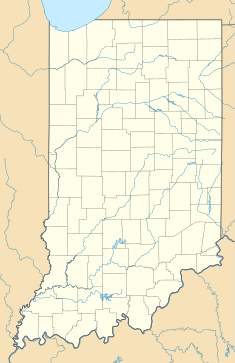Whiting Refinery
| Country | United States |
|---|---|
| Province | Indiana |
| City | Whiting |
| Coordinates | 41°40′23″N 87°28′43″W / 41.67306°N 87.47861°WCoordinates: 41°40′23″N 87°28′43″W / 41.67306°N 87.47861°W |
| Refinery details | |
| Operator | BP Products North America |
| Owner(s) | BP |
| Commissioned | 1889 |
| Capacity | 415,000 bbl/d (66,000 m3/d) |
| No. of employees | 1800 |
The Whiting Refinery is an oil refinery located on the southwestern shore of Lake Michigan and the Indiana Harbor Ship Canal and operated by BP. The facility is primarily located in Whiting, Indiana, USA, though portions of the 1,400 acres (5.7 km2) complex span into the neighboring cities of Hammond and East Chicago.
The refinery was established in 1889 by Standard Oil of Indiana. It is the sixth largest refinery in the US and has a capacity of more than 400,000 barrels per day (64,000 m3/d) of crude oil.
In 2012 BP undertook a $400M modernization project at Whiting to remove older, less efficient equipment and to install state-of-the-art pollution controls to emissions which will "reduce harmful air pollution that can cause respiratory problems such as asthma and are significant contributors to acid rain, smog and haze, by more than 4,000 tons per year." The new Gas Oil Hydrotreater and Coker with a reconfigured distillation unit. The new Pipestil 12 unit which was upgraded with a coker to handle the heavier Canadian crude oil was built to increase energy security in the Midwest by replacing lighter crude oil with heavier crudes.
In August 2015 the most important unit of the Whiting refinery, capable of handling 240 thousand barrel per day and known as Pipestill 12, was shut down - reportedly due to holes found in piping, "disrupted markets throughout the region." The price of oil in Oklahoma fell and the price of gasoline in the USA Midwest increased. The price of Western Canadian Select, the heavy crude oil from western Canada refined at the Whiting refinery, fell to $20/bbl - its lowest price in nine years, causing the Canadian oil to be redirected into oil storage at the Oklahoma storage hub. An oil buildup at the Cushing hub is causing a spread between the price of the North American oil (known as the WTI) and the European price (known as Brent). That spread has averaged about $6 for 2015. During 2013 when the Pipestil 12 unit was upgraded to handle the heavier Canadian crude oil, the WTI-Brent spread increased to over $20. As of August 2015 the Cushing oil hub is at 80% of its 71 million barrel capacity, rising at the rate of about 1 million barrels a week.(subscription required)
...
Wikipedia

